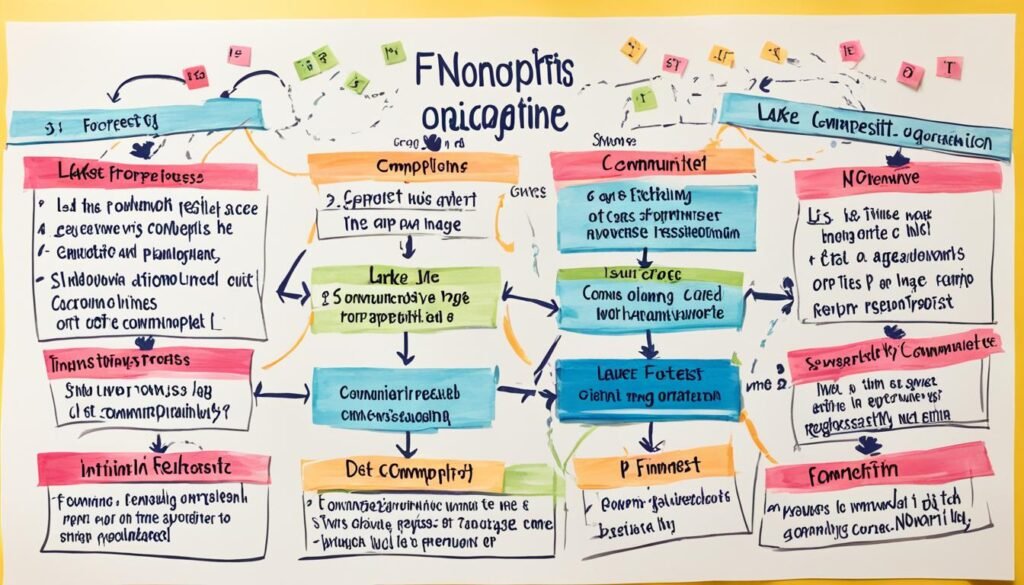Did you know there are more than 1.5 million registered nonprofits in the U.S.?
Starting a nonprofit might feel overwhelming, but it’s simpler with good advice. A skilled nonprofit lawyer in Lake Forest can help.
This guide will show you how to start a nonprofit that doesn’t pay taxes, gets legal status, and raises money for charity. We’ll go from picking a name to getting a federal tax exemption. With a nonprofit lawyer’s help, each step will be clear, setting up your nonprofit well.
Key Takeaways:
- Expert help from a Lake Forest nonprofit lawyer is key to forming a nonprofit.
- This guide gives you what you need to know to start your nonprofit journey.
- Important steps include picking a legal name, writing bylaws, and applying for tax exemption.
- A nonprofit lawyer ensures all steps are done right and quickly.
- With this guide and legal advice, you’ll lay a strong foundation for your nonprofit and help your community.
Understanding Nonprofit Formation
Before starting a nonprofit, it’s key to grasp the legal needs and rules. A nonprofit aims to serve the public or a specific group. It works differently than a typical business.
To be tax-exempt under Internal Revenue Code section 501(c)(3), you must meet IRS standards. You need a clear goal and work for charitable, educational, or religious reasons. Also, ensure no one personally profits from the organization.
Legally forming your organization means preparing articles of incorporation. These outline your group’s purpose, structure, and rules. You also need bylaws and must keep corporate records to show your operation’s transparency and responsibility.
Following these legal steps helps your nonprofit build a solid base. It allows you to work within IRS guidelines.

| Legal Requirements | 501(c)(3) | Tax-Exempt Status | Articles of Incorporation | Bylaws | Corporate Records | IRS Regulations |
|---|---|---|---|---|---|---|
| To establish a nonprofit organization, you must comply with various legal requirements. | 501(c)(3) refers to the specific section of the Internal Revenue Code that grants tax-exempt status to eligible nonprofit organizations. | Obtaining tax-exempt status is crucial for nonprofit organizations to receive certain benefits, including exemption from federal income tax. | Articles of incorporation are legal documents that outline the purpose, structure, and governance of a nonprofit organization. | Bylaws are a set of rules and regulations that govern the internal affairs and operations of a nonprofit organization. | Corporate records include essential documentation that demonstrates the transparency and accountability of a nonprofit organization’s operations. | IRS regulations encompass the guidelines and requirements set forth by the Internal Revenue Service for nonprofit organizations seeking tax-exempt status. |
Choosing a Legal Name and bylaws
Picking the right legal name is a key first step for your nonprofit. It should show what your group is about. Make sure your name stands out to avoid mix-ups with others.
A good attorney can help check that your name meets all legal rules and is free for you to use.
Your chosen name will be how you do business and make deals. It’s vital to pick a name that fits your goal. It should also appeal to the people you want to reach.
An expert attorney will help choose a name that shows your mission. They make sure it follows the law. Plus, they check to ensure no one else has your chosen name. This avoids legal trouble and confusion.
You also need to write bylaws for your nonprofit. These bylaws are rules on how to run your group. They’re key for clear leadership and obeying the law.
Work with your attorney to draft detailed bylaws. These should cover leadership roles, how to make choices, member rights, and how to handle money. Your lawyer will help refine these bylaws. This ensures they match your nonprofit’s aim while still following legal rules.
Example: Bylaws
“The board of directors shall consist of X members, elected by the organization’s membership, and shall be responsible for making decisions on behalf of the organization. X members shall constitute a quorum for making decisions.”
– Sample excerpt from nonprofit organization bylaws
Choosing a fitting name and writing bylaws are crucial. They set the foundation for your nonprofit. With a skilled attorney, your nonprofit’s name and bylaws will reflect your mission. This helps in making clear rules for leading and making decisions.

Obtaining Tax-Exempt Status
To get tax-exempt status for your nonprofit, you must apply to the IRS. You’ll need to submit Form 1023 or the simpler Form 1023-EZ. They require details about your group’s activities, money matters, and rules.
The full Form 1023 is detailed. It asks for info on your group’s goal, makeup, programs, and finances. You must share your mission, income sources, and plans for meeting IRS rules.
*img src=”https://seowriting.ai/32_6.png” alt=”Tax-exempt status”*
Some smaller groups may use Form 1023-EZ if they meet IRS rules. It’s shorter and easier, meant for less complex groups.
It’s essential to fill out these forms carefully and fully. Missing or wrong info can mean delays or a no from the IRS.
After preparing all documents and filling out the form, send it to the IRS. They’ll review it and respond. If they say yes, your group gets tax-exempt status. This includes no federal income tax and tax-deductible donations.
Compliance and Record-Keeping
To keep your nonprofit on the right side of the law, it’s key to stay compliant. This means you need to keep detailed records of what your organization does. This includes documenting board meetings and all money matters. A corporate records book is perfect for keeping track of these essentials.
Corporate records book
A corporate records book is crucial for any nonprofit wanting to keep their records straight. It holds key documents like bylaws and records from meetings. This book makes it easy to show you’re meeting legal standards and keeping your governance strong.
Minutes
Minutes are the written notes from your meetings, capturing what was discussed and decided. These notes are important for being open and accountable. Keeping these records helps make sure your board’s decisions support your nonprofit’s goals.
Postincorporation filings
After your nonprofit starts, you must file certain documents with government agencies. These include financial reports and updates on your organization’s leadership. These filings prove you’re following the law closely.
Governance
Governance is all about how your nonprofit makes decisions and runs its operations. Good governance ensures your group stays focused on its mission and meets its legal duties. Keeping tight records shows you’re serious about being ethical and responsible.
It’s smart to work with a lawyer who knows about nonprofits. They can help you understand how to keep up with legal stuff. This way, you’ll have all the documents you need to show you’re doing things right.
Expert Legal Guidance for Nonprofit Formation
Consulting with a savvy attorney is key for nonprofit setup. At Super Attorneys Of Irvine, you get top legal help through every step. They know nonprofit law inside out, making sure you meet all rules for tax exemption.
They help write bylaws, set up paperwork, and keep you on track legally. A nonprofit formation attorney is super helpful for your group.
With their guidance, handling complex laws becomes easier. You’ll ensure your group follows every law. They’re pros at getting you tax-exempt status without a hitch.
They also help with compliance policies and keeping neat records. Their knowledge in crafting bylaws and records keeps you tidy and transparent. This ensures your organization runs smoothly.
Why You Need a Nonprofit Formation Attorney
The process of starting a nonprofit is filled with legal hurdles. An experienced lawyer smooths the way, ensuring you meet all legal standards for a tax-exempt entity.
“A nonprofit formation attorney gets the challenges of nonprofit law. They’ll pinpoint your goals, direct you through key steps, and aid in making smart choices. With their support, your nonprofit will be founded on firm legal ground.”
For issues like tax exemption, following the law, or keeping proper records, a nonprofit formation attorney is your go-to expert. They’ll guide you through setting up, making the whole process clearer.
Find Your Ideal Nonprofit Formation Attorney in Lake Forest
Are you planning to start a nonprofit? The reputable law firm, Super Attorneys Of Irvine, is here to help. They will connect you with a skilled nonprofit formation attorney in Lake Forest. Super Attorneys Of Irvine serves clients in Lake Forest and nearby in Orange County, California. They are experts in nonprofit formation.
Having a knowledgeable attorney is key for forming a tax-exempt nonprofit. The team at Super Attorneys Of Irvine knows California nonprofit law inside and out. They will guide you through each step, from picking a legal name to filing the necessary paperwork.
The team doesn’t just know the law; they want to get to know you. During personalized consultations, they learn about your needs and goals. With their guidance, your nonprofit will start on a solid legal foundation. For expert advice, contact Super Attorneys Of Irvine to meet a nonprofit formation attorney in Lake Forest.
Contact Information:
Super Attorneys Of Irvine
Address: [Insert Address]
Phone: [Insert Phone Number]
Email: [Insert Email Address]

